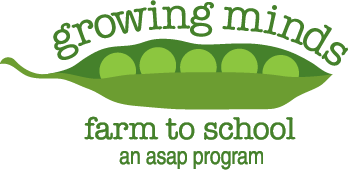Session One:
Procurement/How School Food Works – To create positive food environments for our children we must first understand how school food systems work. Child Nutrition Directors from two western North Carolina school systems will help demystify how school food works, share how they are working to increase purchasing from local farms, and offer ideas for ways to support healthy change in the school cafeteria.
Early Childhood – Farm field trips, school gardens, and classroom cooking for the younger set…Farm to School rocks in the early childhood education setting. A preschool teacher will share her secrets to engaging this age group in Farm to School lessons and activities.
Farm Fresh Food – Local Food cooking is about celebrating the season and the bounty offered right here in our communities. Join a Biltmore chef and to learn how to prepare local fruits and vegetables throughout the school year. With a focus on recipes that do not involve any heat, the Biltmore chef will give you the skills and confidence needed for simple and creative classroom cooking in any season.
Session Two:
Making the Local Farm Connection – Building positive relationships with local food and farms is at the heart of the Farm to School movement. While farm field trips, school gardens, cooking with kids, and serving local in the cafeteria are very tangible, concrete components of Farm to School, the “local farm” piece can often get lost in the shuffle of healthy food and experiential education. This workshop will address the importance of the local farm connection in Farm to School and share strategies for building these connections throughout the school day and across curriculum areas.
Sustaining Farm to School – Many schools find the momentum to get Farm to School started through schools gardens, cooking, or field trips, but what can you to do make sure your program thrives? Focusing on building connections, ASAP staff will offer strategies for sustaining a Farm to School program at your school, including ideas for funding, community engagement, policy and promotions.
Tastings in Classroom and Cafeteria – Do you wish you could get children excited about eating fruits and vegetables? Taste tests are a fun and easy way to introduce children to fruits and vegetables and can be conducted in a variety of locations and using different approaches. This workshop will provide you with ideas and resources to conduct your own taste tests in classroom or cafeteria settings.
Session Three:
Schools Gardens 101/Garden as Instructional Tool – Learn the ABCs of growing a garden and how to use the garden as a motivating and inspiring teaching tool. Find out how you can incorporate the garden into exciting language arts, science, math (and more!) lessons. Come away with activity and lesson ideas sure to captivate your students.
F2S Cooking in the Classroom – Interested in introducing your students to local fruits and vegetables but don’t know where to begin? Learn how to lead interactive cooking demos in your classroom from chef Adam Hayes of the Red Stag Grill. This workshop will feature an introduction to cooking in the classroom and highlight different ways to connect cooking with curriculum across grade levels.
Farm to School in WNC – Farm to School programs can include local food served in cafeterias, school gardens, farm field trips and local food cooking. But, who is leading the effort, how it is integrated into curriculum, and what success looks like can be different at every school. Join in this workshop to hear how three schools in our region have been able to integrate Farm to School into their school day.
